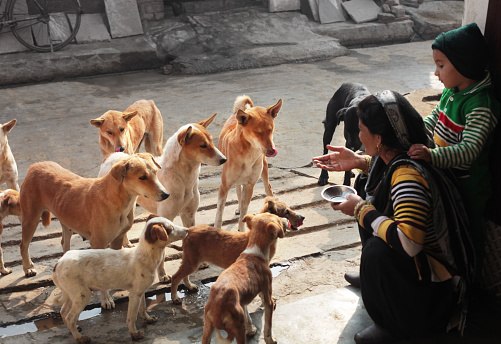
Barring a few countries, rabies is endemic in both humans and animals in most countries in the Asia and the Pacific (AP) Region, with dog-mediated rabies being the predominant source of disease. However, it is often under-reported and is therefore considered to be a neglected disease. Over 95% of human rabies cases are associated with dog bites.
To achieve the global goal of elimination of dog-mediated human rabies by 2030, one of the most important components to focus on is the mass vaccination of dogs to create herd immunity in the reservoir population. Although a few countries in the AP Region have initiated some activities on mass dog vaccination (MDV), upscaling such initiatives has been difficult. Free-roaming dogs form the bulk of the high-risk population in the region and this together with other factors (socio-cultural, technical capacity, resources, coordination etc.) have been constraints in implementing MDV campaigns in the region.
Implementing MDV in free-roaming dog populations requires an understanding of dog ecology, socio-cultural practices, proper planning, coordination, resource mobilization, and use of appropriate tools. An understanding of the concepts and methods including MDV tools could be useful in addressing many of the constraints.
(Bengaluru, India) During the 2022 training of trainers workshop, participants made field visits to witness the implementation of dog population management and MDV activities.
The WOAH Regional Representation for Asia and the Pacific (RRAP), based in Tokyo, jointly with the WOAH Reference Laboratory for Rabies in India and Mission Rabies, organised the first Regional Training of Trainers Workshop on Mass Dog Vaccination (MDV) at Bengaluru, India from 28 November to 2 December 2022.
Twenty-four government officials working on rabies control from Bangladesh, Bhutan, Cambodia, India, Indonesia, Myanmar, Nepal, Philippines, Thailand, and Sri Lanka were trained on concepts, tools, and strategies on MDV, oral rabies vaccination, dog population management (DPM), rabies diagnosis and surveillance. The participants found the training very useful and requested WOAH to continue providing such trainings.
owing to lack of trained manpower and coordination.
Since the first training, we have seen some progress such as initiation of MDV campaigns in several States in India including Kerala and Maharashtra (Mumbai city). Bhutan has achieved almost 100% vaccination of free-roaming dogs. Similarly, Nepal has initiated activities on MDV and rabies surveillance and now, through the UAR country partnership project, there will be a focussed approach for MDV in one district in western Nepal. Bangladesh is continuing its MDV campaigns.
However, many countries still face challenges in undertaking MDV campaigns owing to lack of trained manpower and coordination. Therefore, WOAH RRAP, jointly with Mission Rabies organized the Second WOAH Training of Trainers on MDV (ToT-MDV) for rabies endemic and priority countries in the AP region. The training provided information on MDV tools and practices: principles, concepts, and methods used in the region and elsewhere to build capacities and encourage countries to upscale MDV. The ToT also covered concepts and approaches for understanding dog ecology and estimation of dog population focusing on free-roaming dogs. The proof-of-concept of using oral rabies vaccines (ORVs) in complementing parenteral vaccination of dogs, targeting the free-roaming dogs, were also covered. The training was conducted in Chiangmai, Thailand where Mission Rabies has its International Training Centre under the name of WVS Thailand.
Experts from Mission Rabies / Worldwide Veterinary Service provided training using theory and on-site practical techniques on MDV tools and methods.
The ToT-MDV contributed to the following objectives:
Dates: 25-28 November 2024
Location: Chiang Mai, Thailand
Participation: By invitation
Agenda + presentations: PDF (available presentations linked)



